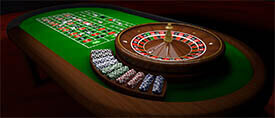Pivot System
The popularity of roulette over the decades has led to the formulation of a bewildering array of systems, some of them requiring mathematical calculations to operate. But roulette players who prefer to keep their strategies simple have tended to favour methods such as the Pivot System, which has something in common with the One Hit Wonder and Memory Game.
By Adiela de Bruyn - Last modified 2024/02/08 - Estimated reading time: 3 minutes.
Table of contents

More Details
This system is based around the idea that during every session, there is such a thing as ‘hot numbers’ or numbers that crop up with greater regularity than others. The idea came from the observations of regular roulette players who noticed that in a given set of 36 spins of a roulette wheel, not all of the 36 numbers occur. Although in the long term the frequency with which each number comes up will even out, this isn’t the case in the short term.
To operate the system, players have to note which numbers come up. As soon as a number repeats, then you begin to bet on that number from the next spin onwards. You continue to bet that number for 35 spins or until it comes up again, whichever should come first. When the number comes up or you reach 35 spins without a win, you start the process again, choosing the next number to repeat itself.
Unlike progressive or variable strategies, all of the bets made using the Pivot System are at the same amount. Players who regularly use this system usually set themselves a profit target for a session of play, and end the session when they hit their target.
Pros and Cons
One of the obvious advantages of the Pivot System is its simplicity. There are no complicated mathematical calculations involved, and the level staking aspect means you don’t need to work out different bet levels as you play. By betting the same amount on each spin, managing your bankroll also becomes easier. There are also none of the dramatic losses associated with riskier strategies such as the Martingale.
The disadvantages of this strategy are similar to those for the One Hit Wonder and Memory Game methods, both of which also fall foul of the Gambler’s Fallacy. This is the belief that past results will have an influence on future results, which is false. The roulette wheel does not have a memory. Every number has an equal possibility of coming up each spin, regardless of how many times it has come up previously. So while it is possible to look back over 36 spins of roulette and note that only two thirds of the numbers have come up, the process is random, and impossible to predict.
The only exception to this truth is on the rare occasions when a physical roulette wheel in a land-based casino does not run fairly because of imperfections in its operation. In those circumstances, the frequency of certain numbers occurring may reflect the fact that the wheel is not working optimally. Unfortunately, this is of no use to online roulette players. Virtual wheels at reputable online casinos operate purely at random!
The simplicity of the Pivot System, and the relatively small incremental losses it incurs, can make it a good system for roulette newcomers to try out, but as it is based on the incorrect theory of ‘hot numbers’ ultimately it is not an effective long term strategy.







